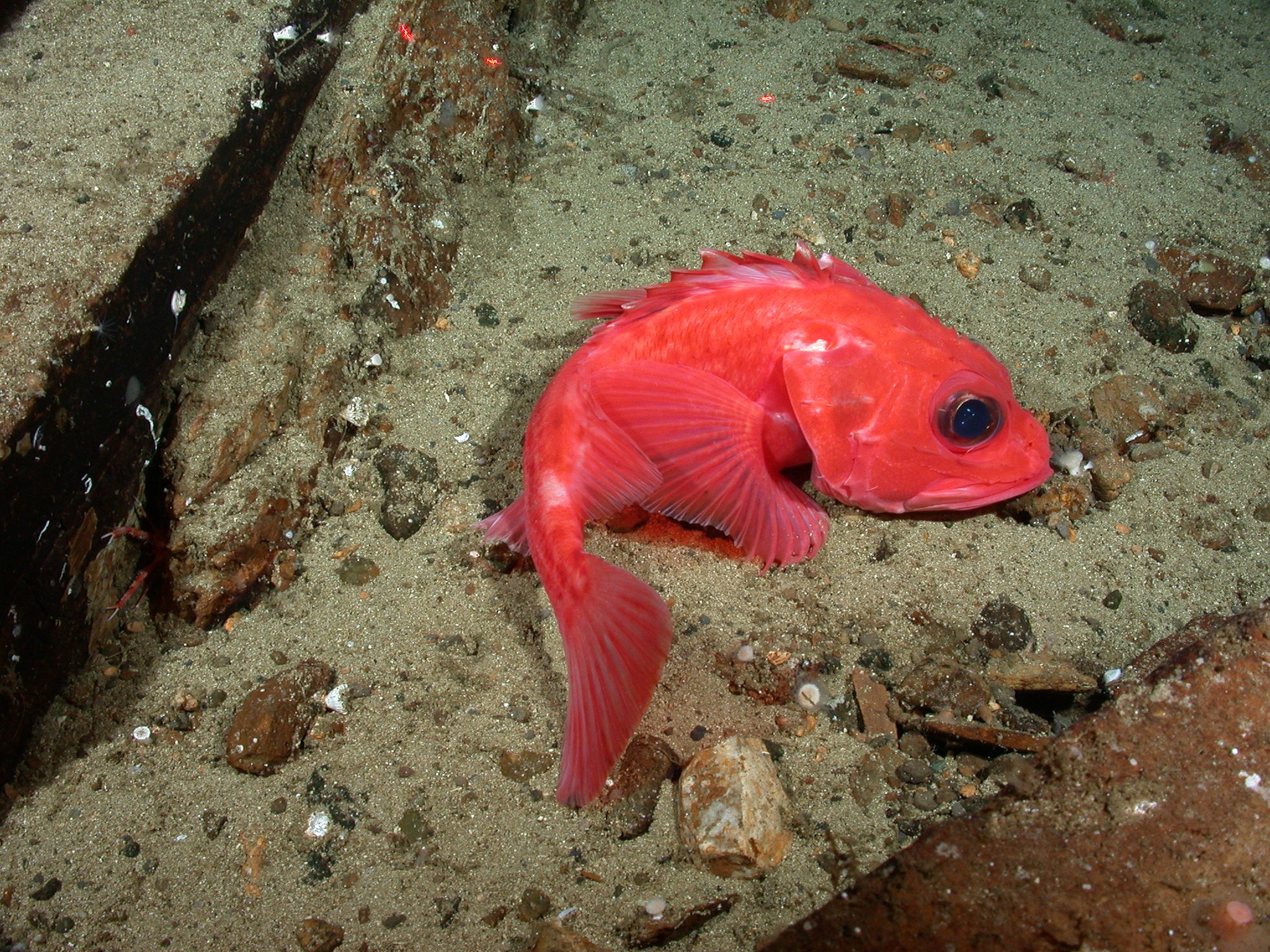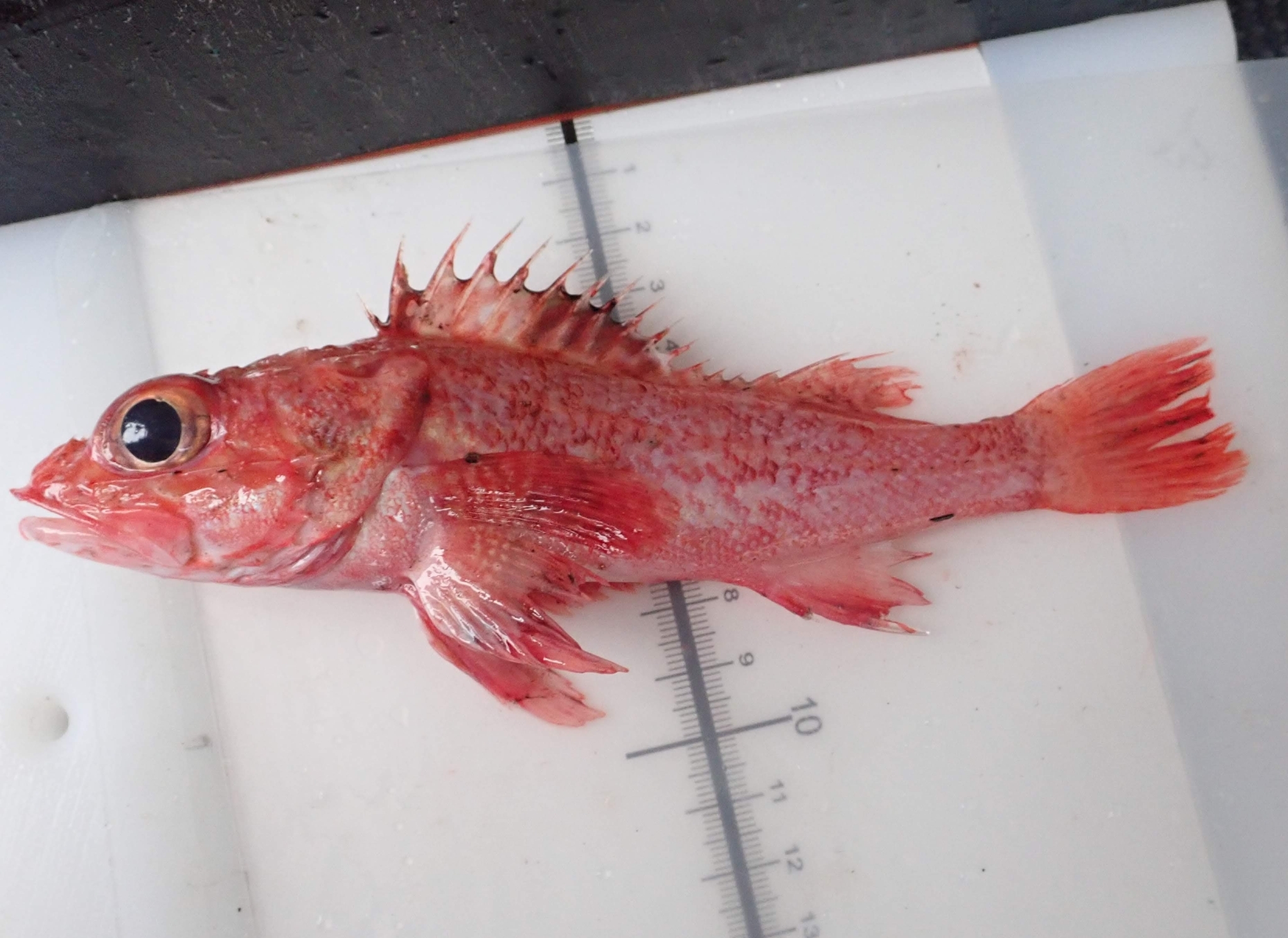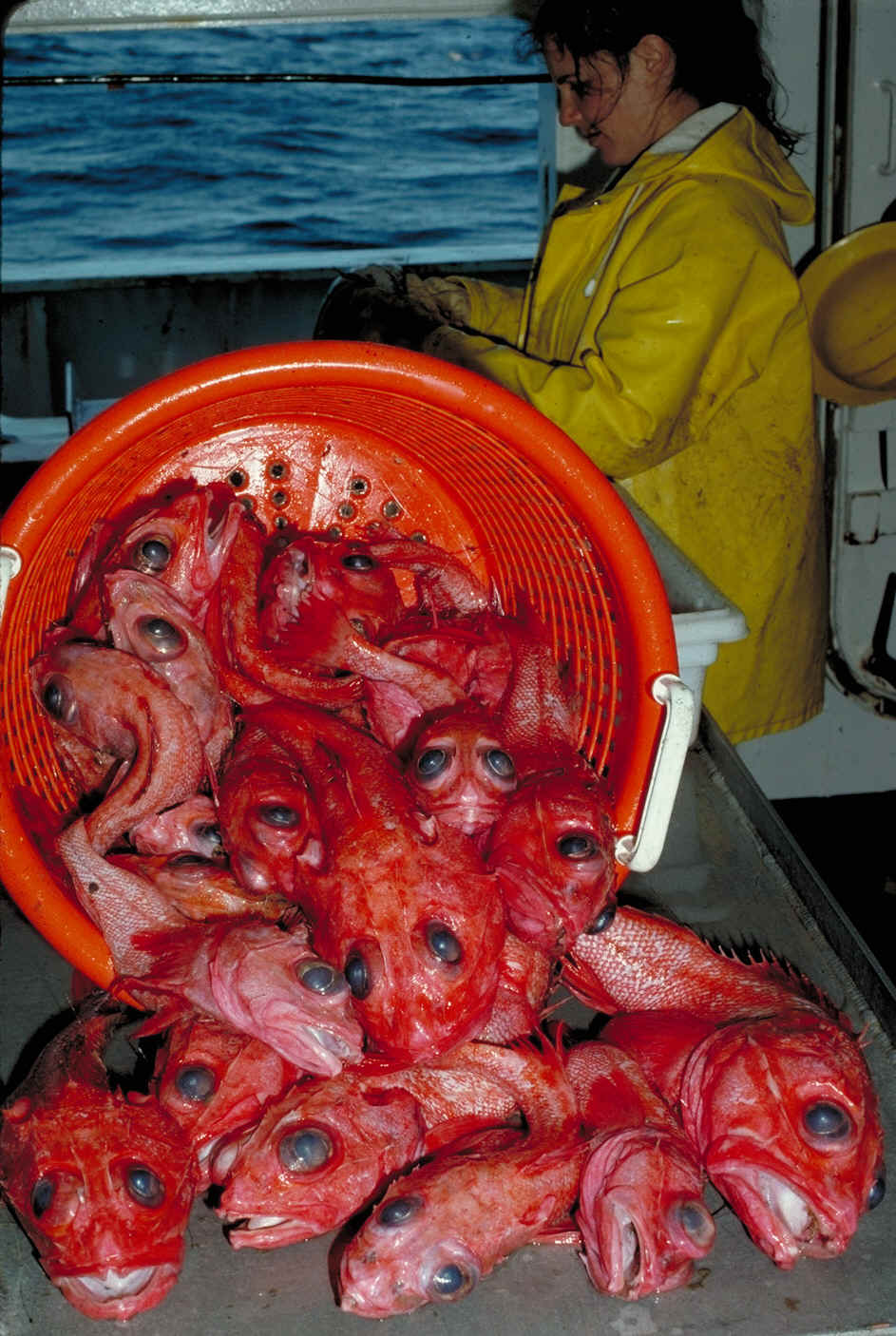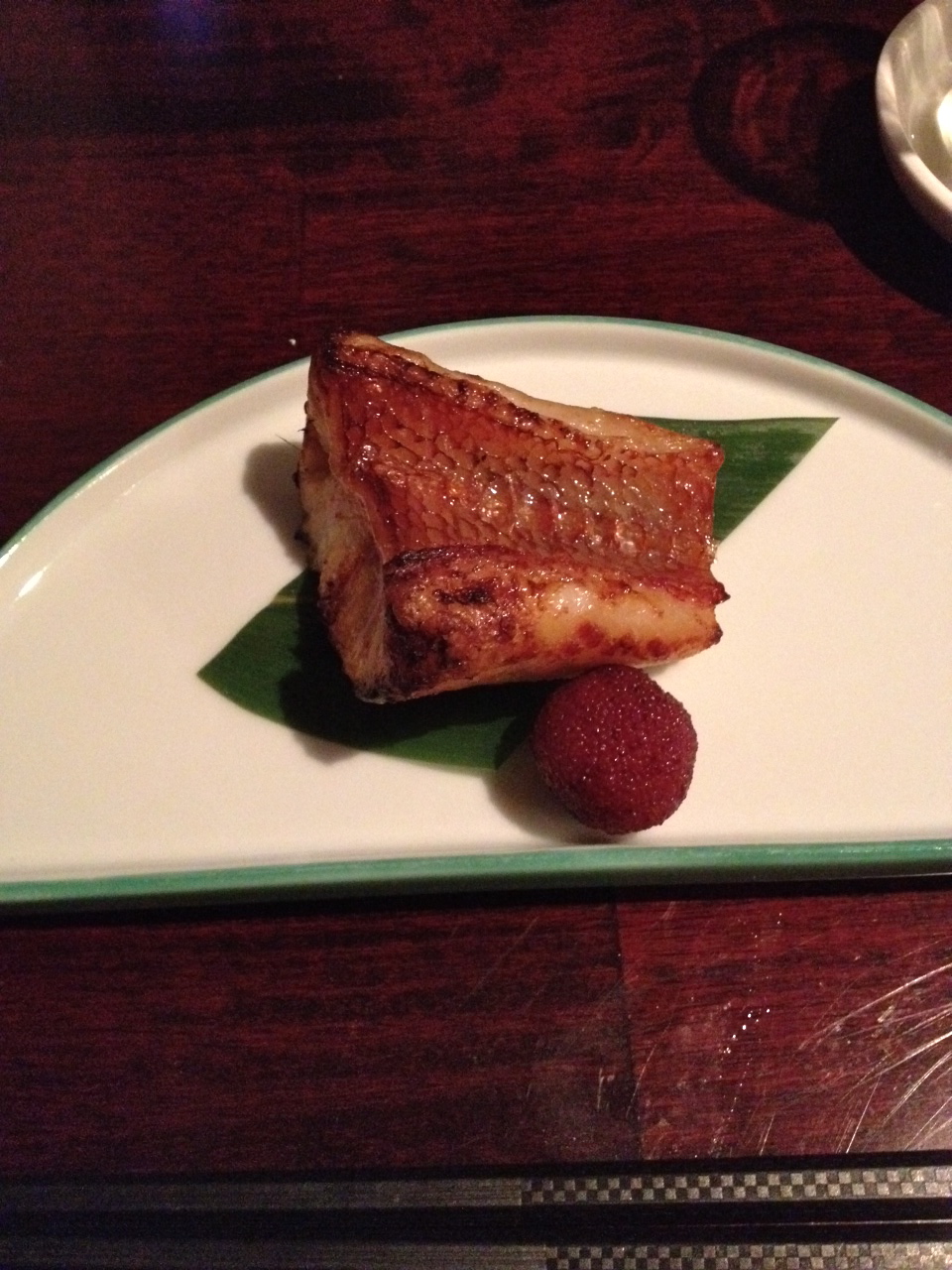Sebastolobus alascanus
North Coast (Oregon Border to Point Arena)
North Central Coast (South of Point Arena to Half Moon Bay)
Central Coast (South of Half Moon Bay to Point Conception)
Santa Barbara (Point Conception to Point Dume)
South Coast (Point Dume to Mexico border)
Firm fish
Flakey fish
Wild caught

The Science

Taxonomic description
- Bright red with some black on its fins, a large head and elongate body, and a strong spiny ridge on its head. [2]
- Caudal tail is slightly rounded, and can reach lengths of up to 80 cm (2.62 feet). [1,2]
- Its spiny ridge has dorsal spines that are about the same length, in contrast to its cousin the longspine thornyhead. [2]
Distribution
- Found from the Bering Sea all the way to Baja California, Mexico. It has also been found in Japan. [1,2]
Life history
- Can live 80 to 100 years! [1]
- Grows slowly, and females are typically larger than males. Females reach maturity around 18 cm (7 inches), around 8 or 10 years in age. [1]
- Has internal fertilization, and females spawn eggs in floating, gelatinous masses. [1,2]
- Typically spawns between December and May along the West Coast. [1]
Habitat
- Lives demersally (near the seafloor) usually over soft bottoms at water depths of 17-1600 m (18.6-1749 yards). [2]
- Feeds on shrimp, crabs, zooplankton, amphipods, and other benthic invertebrates. [1]
- Migrates into deeper waters when it gets older, unlike its cousin, the longspine thornyhead . [5]
The Fishery

Seasonal availability
- Available year-round. [1]
Regulatory and management authority
- This fishery is managed federally by the NOAA fisheries and, as established by the Magnuson-Stevens Act, the Pacific Fishery Management Council (PFMC) through the Pacific Coast Groundfish Fishery Management Plan (FMP). [1]
- As established by the Marine Life Management Act, the California Fish and Game Commission (CFGC) regulates the fishery in state waters, and the California Department of Fish and Wildlife (CDFW) manages this fishery. [3]
- The California Groundfish Collective combines input from the industry and government entities to inform regulatory and management measures for this fishery. [8]
Gear type
- Typically caught with trawl, longline, and pot gear. [1]
Status of the fishery
- Although the IUCN classified this species as endangered in 2000, current stock assessments have found that this species is not overfished as of 2018. [1,4]
Potential ecosystem impacts
- Unregulated or ill managed bottom trawling can cause damage to sensitive deep-sea habitats. [1]
- Lost traps from pot gear fishing and longline contribute to the problems of ghost fishing and bycatch, where organisms are unintentionally caught. [6]
The Seafood

Edible portions
- The whole fish is edible. [1]
Description of meat
- The meat cooks white, has a sweet and mild taste, and has firm, coarse flakes. [1]

Culinary uses
- Can be prepared like any other rockfish. Recommended cooking styles include grilled, sauteed, poached, baked, or deep fried. [9]
- For a Cantonese steamed rockfish recipe, visit Rasa Malaysia. [7]
- For a Japanese simmered thornyhead recipe, visit NHK World-Japan. [14]
Nutritional information
- Nutritional information for 100g of raw shortfin thornyhead can be found on the nutritional information table. [1]
- As a rockfish, thornyhead is high in selenium! [1]
Toxicity report
- None to report.
Seasonal availability
- Available year-round. [1]
References
[1] NOAA Fishwatch. 2020. Shortspine Thornyhead. Web. https://www.fishwatch.gov/profiles/shortspine-thornyhead. Accessed 14 December 2020.
[2] Froese, Rainer. Fishbase. n.d. Sebastolobus alascanus. Web. https://www.fishbase.se/summary/Sebastolobus-alascanus.html. Accessed 14 December 2020.
[3] Marine Life Management Act. n.d. California Department of Fish and Wildlife. Web. https://wildlife.ca.gov/Conservation/Marine/MLMA. Accessed 24 August 2020.
[4] Bell, T. & Guttman, A. 2000. IUCN. Sebastolobus alascanus. The IUCN Red List of Threatened Species. https://dx.doi.org/10.2305/IUCN.UK.2000.RLTS.T29609A9504511.en. Accesse... December 2020.
[5] Barnes, J.T. et al. California Department of Fish and Game. 2001. California’s Living Marine Resources: A Status Report. Web. https://nrm.dfg.ca.gov/FileHandler.ashx?DocumentID=34364&inline. Accessed 22 December 2020.
[6] Monterey Bay Aquarium. 2020. Fishing and Farming Methods. Web. https://www.seafoodwatch.org/seafood-basics/fishing-and-farming-methods. Accessed 22 December 2020.
[7] Rasa Malaysia. n.d. Chinese Steamed Fish. Web. https://rasamalaysia.com/steamed-fish-recipe/. Accessed 22 December 2020.
[8] The Nature Conservancy. 2015. The California Groundfish Collective. Web. http://www.cagroundfish.org/#our-story. Accessed 2 December 2020.
[9] NOAA Fisheries. 2020. Eight Delicious Fish You May Have Not Tried. Web. https://www.fisheries.noaa.gov/feature-story/eight-delicious-fish-you-ma.... Accessed 23 December 2020.
[10] NOAA Photo Library. flickr. 2010. fish2518. Digital image. Web. https://www.flickr.com/photos/noaaphotolib/11468748386/. Accessed 23 December 2020.
[11] linddealy. iNaturalist. 2018. Digital image. Web. https://www.inaturalist.org/photos/66944508. Accessed 24 February 2021.
[12] NOAA Alaska Fisheries Science Center. Shortspine thornyhead. Photo of thornyhead fish in basket. Digital image. Web. https://archive.afsc.noaa.gov/groundfish/RockfishGuide/Rockfish_Pages/Sh.... Accessed 23 December 2020.
[13] T.Tseng. flickr. 2012. Grilled idiot fish. Digital image. Web. https://www.flickr.com/photos/68147320@N02/8432409424. Accessed 24 February 2021.
[14] NHK World-Japan. Dining With the Chef. 2017. Simmered Kinki Fish. Web. https://www.nhk.or.jp/dwc/recipes/detail/314.html. Accessed 3 February 2021.
